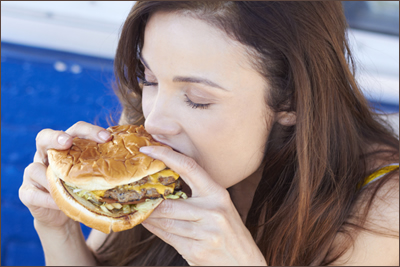How To Indulge Without Ruining Your Diet

Cheating on your taxes, on a test, etc…it’s just plain wrong. Chances are, even if you were to consider cheating, you probably wouldn’t ask for permission from your accountant or your teacher. So, why are people always asking me if it’s okay to cheat on their diet? Does it feel good to be bad? Do they want to place the blame on my shoulders if their cheating doesn’t lead to weight loss? Or maybe they’re simply saying, “I just can’t be this strict with myself every single day - I need a break!”
Let me start by saying that, at least when it comes to dieting, I don’t like to use the word “cheat.” And here’s why. Most of us don’t cheat on our taxes, on tests or on our partners - because we know it’s wrong. If we did cheat, we’d feel really bad about it. Following the same logic, if you cheat on your diet, it must be wrong and you’re going to feel bad for having done it. So, let’s just dispense with the word cheat right off the bat.
Cheat or treat?
Since “cheat” sounds so negative, let’s call it something more positive instead. I think “treat” sounds a lot better. There’s nothing wrong with treating yourself once in a while, especially if you’ve banked some calories in advance for your indulgence. If you’ve saved up some calories all week so you have a few extra to spend on the weekend, is that cheating? Sounds more like good planning to me.
Why do you feel the need to cheat?
Before you start planning, you might want to think about why you feel the need to cheat in the first place. Are you being too strict with your eating and cutting back too far? Are your regular meals not satisfying or enjoyable? Are cheating and being bad your reward for being good all week? One way to stifle the need to stray from your eating plan is to get to the root of the problem.
Trying to adhere to an overly strict diet is probably one of the most common triggers for cheating. Maybe you manage to hold things together pretty well all week, so you figure you deserve to cut loose and enjoy yourself on the weekend.
But if you’re eating yourself into a stupor every weekend because you “deserve it,” not only are you likely to undo any progress you made during the week, you’re also rewarding your good behavior with high calorie food. Over time you associate your healthy weekday foods with penalty, and your high calorie weekend indulgences with reward - which isn’t likely to foster lifelong healthy eating habits.
The other problem is that if you haven’t figured out the number of extra calories you can safely spend on the weekend, it’s too easy to tell yourself that you’ve been so good all week that you can’t possibly overdo it. Trust me - you can.
Planning your pleasure
So, there’s a fine line to making this work, and it all depends on proper planning - which involves banking some calories and spending them wisely.
I’m more inclined to advise people to limit their “treat” to one meal rather than taking the whole day off. There’s a big difference between eating something special that isn’t on your usual meal plan and taking the entire day off to eat whatever you want. For some people, a whole day without dietary restrictions can be like a train without brakes - and can cause nearly as much damage.
But planning ahead for a “treat meal” is a lot easier to control. First, consider your allotted calorie intake for the whole week. Then determine how many calories you can set aside each day to accumulate what you’ll need to spend on your splurge. It also helps to be as specific as you can when you plan, where, and how you’re going to spend your calories. Telling yourself, “I’ve been good all week so I can have a nice steak dinner” may not work as well as, “I’m saving up 400 calories this week because I’m going to Rosie’s Restaurant on Saturday night, and they make the best apple pie.”
Treating isn’t cheating
If you feel that your cheating is the result of a too-strict diet, consider this: Those who naturally maintain their weight manage to have a treat from time to time. It’s part of life and an important skill to learn. Eating perfectly all the time probably isn’t reasonable. But if you eat three regular meals a day and have a “treat” meal once a week, you’re being “good” for 20 meals out of 21—which is 95% of the time. And when you’ve planned and saved for your splurge, you can enjoy it guilt-free. So, make it special—put it on a plate, eat it slowly, savor it and enjoy it. You earned it.
Based on an article by Susan Bowerman - Herbalife Director, Worldwide Nutrition, Education & Training.

